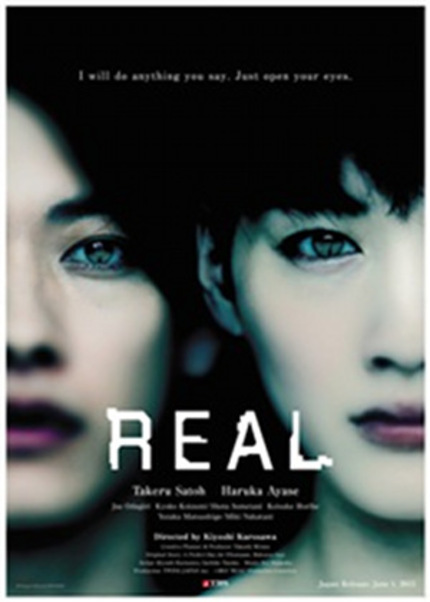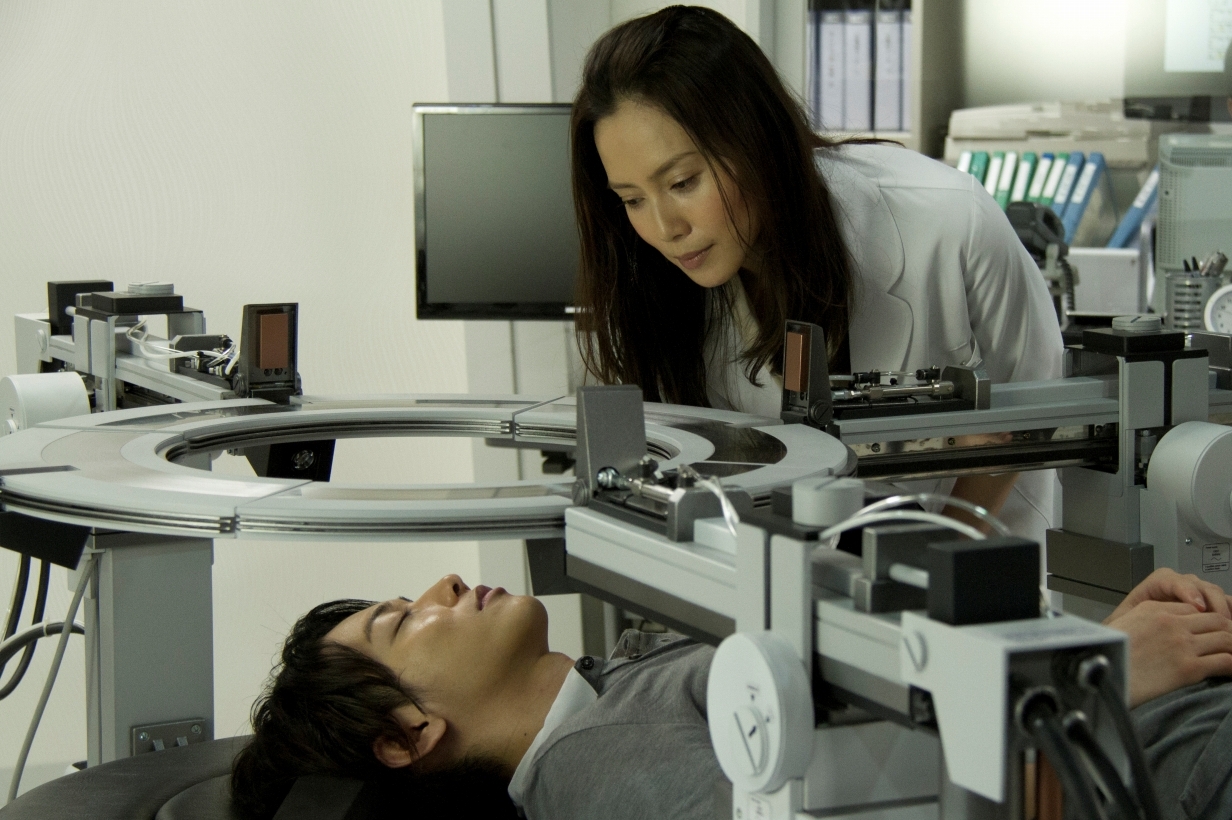Kurosawa Kiyoshi Spills Details On His SciFi Picture REAL

Real is Kurosawa's first feature film since that Cannes success, although he did also direct TV miniseries Penance, which toured the Venice and Toronto festivals in the interim, a pretty unique honour for a TV series.
Based on the novel A Perfect Day for Plesiosaur, Real tells the story of a man who enters the subconscious of his lover to try and unravel the mystery of her apparent suicide. Real stars Sato Takeru who is enjoying the huge domestic and international success of last years Rurouni Kenshin and Ayase Haruka, star who played a blind samurai in Ichi and appeared in Nakata Hideo's The Incite Mill.
The director and his young actor, Sato, sat down at a recent press conference to field questions about their latest work. They started by bravely saying a few words in English to the assorted foreign press, giving Sato-san the opportunity to make a truly awful joke...
[SPOILERS FOLLOW]
TS (Takeru Satoh): Good evening everyone, my name is Takeru Satoh and I'm going to be here with our wonderful director Kiyoshi Kurosawa. Also, I'd like to thank you who have taken the time to see our movie today. I hope you have a REALly good time watching it!
KK (Kiyoshi Kurosawa): That's terrible ... Thank you very much for seeing our film today and giving me the opportunity of talking about it. Let me say at the start that like many Japanese my English is very poor so please forgive me for reading from this translation of what I want to say.
I somehow wanted to make an entertaining film of this well written story while maintaining its sense of mystery right until the very end. To allow me to do this the producers brought together a cast and production staff of the best people in Japan and I knew I would be able to rely on them and as a result this film is different from any I have ever made and a film that I believe is truly unique. I would like to thank above all my young leading lady and leading man, I'm very happy with the way their youthful and talented energy has made this complicated plot line into a true story of young love. I may even dare to say that what we have here is a commercial film of a type not seen before.
Q: I really enjoyed the film. In the film itself there were three interesting scenes for me, one was the toy gorilla when the family was eating lunch, the other was the breeze that seemed to be in the sensing room, and the third one is the drawing of a circle on the mans hand.
KK: First of all, thank you for enjoying my film, I'm also glad to hear that this film was completely different than what you had expected because I personally always want to make something that is new and different than what the audience expects. I'm very happy that you saw and were concerned about the details of this film but I don't quite remember the meanings behind them! It's not that I put these three things in because there was some very deep meaning behind them.
I'm very happy you noticed the breeze in the sensing room because that scene was shot in a studio and what I don't really like about a studio is that when you close everything there's no air moving inside the room. I've always thought that is very unnatural and I don't like it. I wanted to show that there is a world outside the hospital and so there should be an open breeze blowing inside the sensing room so therefore I deliberately added that.
Q: Your idea of switching like you did in the middle of the movie, was that in the original story? Or did you think that up?
KK: It was not in the original novel so in a way it is an original idea but its not my original idea. It came up when we were discussing the story with the producers.
The reason why we came up with this idea is that back when we were discussing we had not finalised with the two stars yet but it was almost sure that we would be able to get these two wonderful stars and we thought they could both play the main role. Having such a wonderful cast we thought it would be very natural to switch the main characters and a good idea to do that.
Also, when they are doing the sensing [a process in the film where a character can enter the subconscious of somebody in a coma] obviously they are lying down and once they are in their subconscious mind they are up and moving around but visually they are lying down and in the real world when one is awake the other is asleep. At the beginning of the story Atsumi is in a coma so therefore she's not moving and I wanted to show and surprise the audience at the end of the movie that the very still girl becomes very active and she does all these actions, that was a twist I wanted to add to this movie.
Q: How much of the story have you taken from the novel?
KK: I don't know exactly how much, obviously there was the novel and we based the story upon that, but having said that we changed about 70%. The remaining 30% is the core of the novel, the spirit of the original novel if you will. In those instances we were very faithful to the original book. We were very grateful as we had the blessing of the original author who said that because this is a movie that he understands that we have to make changes so he was more than happy with those, we were very grateful for his understanding.
Q: This movie had so many essences, it was a mystery, a love story but it must have been very difficult for the actors to play their roles. What was the most difficult part in doing this movie?
TS: This movie was indeed very difficult, everything was very hard but if I had to pick one thing it was the performances in the subconscious realm. I play Koichi and he enters into Atsumi's conscious, so Koichi is asleep in the real world but he's awake in the conscious world of Atsumi which means I could do anything. It was like being in a dream as you can do anything and anything is possible which means I had to make selections and it was very difficult for me to decide how to make those selections.
Q: One thing I was thinking about while watching the movie was Kairo, the movie you made back in 2001, that was a film that creates its own world and is really hard to peg, is it drama? Is it science fiction? Is it horror? It also has this ambition, to be something bigger, I think if you had the money back then you would have made a much more commercial film, so I'm just wondering do you see any connection between say, Kairo, and what your doing now, that ambition to make a bigger commercial film?
KK: At the beginning I wasn't really aware that there was a common thread between Kairo and this movie but as the production went on I realised that there are quite a few common threads and the key point was that there is a love story between the young couple.
Now, I don't make many love stories very often, maybe one every ten years or so, and it's been awhile since I last worked with a young couple and made a love story. If I say that I was not ambitious back then I would be lying and as far as the budget is concerned I'm not quite sure but I can say that the vfx staff that I met on Kairo have been working with me ever since and they worked with me on this movie as well and I am very grateful to them. They probably felt there was more budget on this movie than on Kairo and they worked really hard and surpassed my expectations on the amount and quality of the visual effects in this film and I really felt that their passion and there talent really raised the quality.
Q: This movie was very different than your previous films, but I really liked the use of ruins. That is something that you have had in other films of yours, but was it in the original book or was that something you added as a motif that you like. I also really enjoyed the way the ruins tied in with Mr Sato's story how he was a Tokyo boy and he left this island once his fathers project fails, its almost as if he buried those memories of what happened with the boy when hew left the island and its almost as if it was all connected, maybe you could both talk about that.
KK: As you say I've had themes of ruins in several of my movies in the past but I didn't expect that I would be able to encounter such a vast big scale set of ruins where we were shooting but someone came up to me and said there are amazing ruins in this city. When I went there it was quite amazing and it really made me want to shoot there.
In the original script and original novel there's not really a specific ruin mentioned. They do refer to a house that nobody lives in anymore and an old shipyard so it does hint at the past and the fact that nobody lives there anymore. I wanted to hint at more than just the fact that there is a house where nobody lives anymore. I wanted to stress the fact that it is the past that is lost and these ruins would represent that.
Also in the original novel Koichi's past and the hidden past are not clearly written, it's very complicated therefore in the movie too I couldn't really clarify what it is and what happened and how it led to this trauma but I thought as an image the ruins are something you don't want to actually see as they are very dreadful but they actually exist and I thought that there's a connection between that and Koichi's hidden past so therefore I really wanted to present how dreadful his past is in his memories and symbolically use ruins.
TS: I finally realised for the first time why we shot at the ruins!
Q: It has been announced that Real will get its international debut at the Locarno international film festival in August.
KK: I'm always very curious about how non-Japanese people see my movies.
TS: It's very exciting to imagine that this film will be screened to foreign audiences and I'd like to mention that I'm in the same agency as Fukuyama Masaharu who starred in the Japanese film that won the award for at the Locarno festival, I believe it's called 'Like Father Like Son' and so I would like my film to follow this wonderful result and hopefully we will be able to win something at Locarno too.


Do you feel this content is inappropriate or infringes upon your rights? Click here to report it, or see our DMCA policy.







